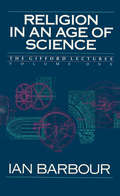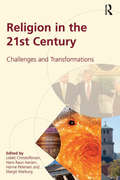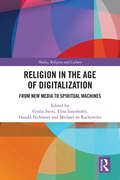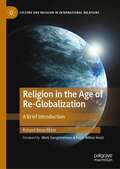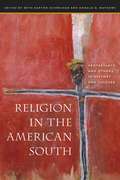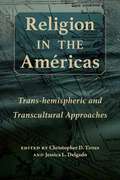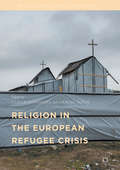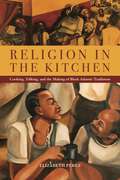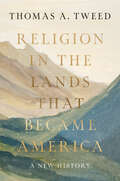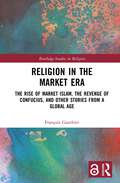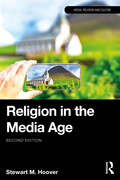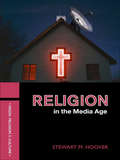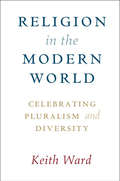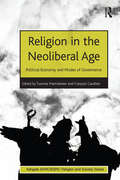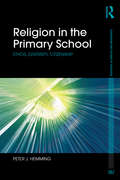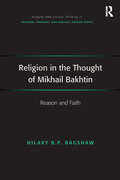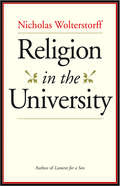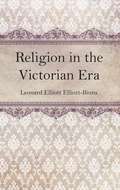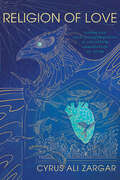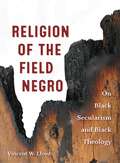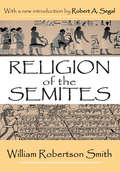- Table View
- List View
Religion in an Age of Science
by Ian G. BarbourReligion and Science is a comprehensive examination of the major issues between science and religion in today's world. With the addition of three new historical chapters to the nine chapters (freshly revised and updated) of Religion in an Age of Science, winner of the Academy of Religion Award for Excellence in 1991, Religion and Science is the most authoritative and readable book on the subject, sure to be used by science and religion courses and discussion groups and to become the introduction of choice for general readers.
Religion in the 21st Century: Challenges and Transformations
by Lisbet Christoffersen Margit WarburgIn spite of the debate about secularization or de-secularization, the existential-bodily need for religion is basically the same as always. What have been changed are the horizons within which religions are interpreted and the relationships within which religions are integrated. This book explores how religions continue to challenge secular democracy and science, and how religions are themselves being challenged by secular values and practices. All traditions - whether religious or secular - experience a struggle over authority, and this struggle seems to intensify with globalization, as it has brought people around the world in closer contact with each other. In this book internationally leading scholars from sociology, law, political science, religious studies, theology and the religion and science debate, take stock of the current interdisciplinary research on religion and open new perspectives at the cutting edge of the debate on religion in the 21st century.
Religion in the Age of Digitalization: From New Media to Spiritual Machines (Routledge Research in Religion, Media and Culture)
by Giulia Isetti; Elisa Innerhofer; Harald Pechlaner; Michael de RachewiltzThis book examines the current use of digital media in religious engagement and how new media can influence and alter faith and spirituality. As technologies are introduced and improved, they continue to raise pressing questions about the impact, both positive and negative, that they have on the lives of those that use them. The book also deals with some of the more futuristic and speculative topics related to transhumanism and digitalization. Including an international group of contributors from a variety of disciplines, chapters address the intersection of religion and digital media from multiple perspectives. Divided into two sections, the chapters included in the first section of the book present case studies from five major religions: Christianity, Islam, Buddhism, Hinduism and Judaism and their engagement with digitalization. The second section of the volume explores the moral, ideological but also ontological implications of our increasingly digital lives. This book provides a uniquely comprehensive overview of the development of religion and spirituality in the digital age. As such, it will be of keen interest to scholars of Digital Religion, Religion and Media, Religion and Sociology, as well as Religious Studies and New Media more generally, but also for every student interested in the future of religion and spirituality in a completely digitalized world.
Religion in the Age of Re-Globalization: A Brief Introduction (Culture and Religion in International Relations)
by Roland BenedikterThis book provides a concise introduction into twenty-one trends that are transforming the role of religion and spirituality in “re-globalizing” societies. In referring to processes of “re-globalization”, the book draws attention to profound ongoing changes in the patterns and mechanisms of contemporary globalization. Inter- and transdisciplinary in its approach, clearly structured, and easy to read, the book analyzes the impact of religious self-understanding, rhetoric, and practice on five core fields: economics, politics, culture, demography, and technology. In turn, it describes the effects of these five fields on religion and spirituality themselves.This book represents a broad, encompassing overview of the main transformations that religion is undergoing today. Roland Benedikter combines a “big picture” approach with a keen attention to the details of specific case studies. With its clear and accessible structure and timely examples, this book is ideally suited for students of international relations and religious studies, and will also appeal to researchers engaged in those fields and to interested general readers. The book is also apt to serve as an encompassing basis for contemporary debates in civil society, including both grassroots and expert discussions.
Religion in the American South
by Beth Barton Schweiger Donald G. MathewsThis collection of essays examines religion in the American South across three centuries--from the beginning of the eighteenth century to the civil rights movement of the 1960s. The first collection published on the subject in fifteen years, Religion in the American South builds upon a new generation of scholarship to push scholarly conversation about the field to a new level of sophistication by complicating "southern religion" geographically, chronologically, and thematically and by challenging the interpretive hegemony of the "Bible belt." Contributors demonstrate the importance of religion in the South not only to American religious history but also to the history of the nation as a whole. They show that religion touched every corner of society--from the nightclub to the lynching tree, from the church sanctuary to the kitchen hearth. These essays will stimulate discussions of a wide variety of subjects, including eighteenth-century religious history, conversion narratives, religion and violence, the cultural power of prayer, the importance of women in exploiting religious contexts in innovative ways, and the interracialism of southern religious history.Contributors:Kurt O. Berends, University of Notre DameEmily Bingham, Louisville, KentuckyAnthea D. Butler, Loyola Marymount UniversityPaul Harvey, University of Colorado, Colorado SpringsJerma Jackson, University of North Carolina at Chapel HillLynn Lyerly, Boston CollegeDonald G. Mathews, University of North Carolina at Chapel HillJon F. Sensbach, University of FloridaBeth Barton Schweiger, University of ArkansasDaniel Woods, Ferrum College
Religion in the Américas: Trans-hemispheric and Transcultural Approaches (Religions of the Americas Series)
by Christopher D. Tirres and Jessica L. DelgadoReligion in the Américas explores the fluid, dynamic, and complex nature of religion across Latin America and its diasporic communities in the United States. Utilizing a transdisciplinary and trans-hemispheric lens, this groundbreaking anthology transcends traditional scholarly boundaries—geographical, disciplinary, and temporal—as it explores ideas and cultural practices that share a common history of Iberian colonialism.This robust collection of essays forges a dialogue among scholars throughout the Americas who represent a variety of disciplinary perspectives. The book is divided into five sections: &“Fluidity in the Afro-Latine Diaspora,&” &“Aesthetics in Las Américas,&” &“Critical Feminist Epistemologies and Activism,&” &“The Limits of Institutional Religion,&” and &“Spiritual Invasions and Contagions.&” Throughout the volume, the concept of &“experience&” serves as a foundational lens, as chapters examine how individuals and communities actively interpret and negotiate their realities within diverse historical and social contexts.Focusing on religion as a culturally conditioned epistemic practice, Religion in the Américas invites readers to engage with religion in the Americas on multiple, intersecting levels of knowledge, including local insights, scholarly analyses, and the positionality and queries of readers themselves. The book&’s dialogical approach encourages not only continual reevaluation of the complexities of religious experience in the Americas but also creative innovation that will inspire new avenues of inquiry.
Religion in the Emergence of Civilization: ÇAtalhöYüK as a Case Study
by Ian HodderThis book presents an interdisciplinary study of the role of spirituality and religious ritual in the emergence of complex societies. Involving an eminent group of natural scientists, archaeologists, anthropologists, philosophers, and theologians, this volume examines à atalhÖyÜk as a case study. A nine-thousand-year old town in central Turkey, à atalhÖyÜk was first excavated in the 1960s and has since become integral to understanding the symbolic and ritual worlds of the early farmers and village-dwellers in the Middle East. It is thus an ideal location for exploring theories about the role of religion in early settled life. This book provides a unique overview of current debates concerning religion and its historical variations. Through exploration of themes including the integration of the spiritual and the material, the role of belief in religion, the cognitive bases for religion, and religion's social roles, this book situates the results from à atalhÖyÜk within a broader understanding of the Neolithic in the Middle East.
Religion in the European Refugee Crisis (Religion and Global Migrations)
by Graeme Smith Ulrich SchmiedelThis book explores the roles of religion in the current refugee crisis of Europe. Combining sociological, philosophical, and theological accounts of this crisis, renowned scholars from across Europe examine how religion has been employed to call either for eliminating or for enforcing the walls around “Fortress Europe.” Religion, they argue, is radically ambiguous, simultaneously causing social conflict and social cohesion in times of turmoil. Charting the constellations, the conflicts, and the consequences of the current refugee crisis, this book thus answers the need for succinct but sustained accounts of the intersections of religion and migration.
Religion in the Kitchen: Cooking, Talking, and the Making of Black Atlantic Traditions (North American Religions)
by Elizabeth PérezHonorable Mention, 2019 Barbara T. Christian Literary Award, given by the Caribbean Studies AssociationWinner, 2017 Clifford Geertz Prize in the Anthropology of Religion, presented by the Society for the Anthropology of Religion section of the American Anthropological AssociationFinalist, 2017 Albert J. Raboteau Prize for the Best Book in Africana Religions presented by the Journal of Africana ReligionsAn examination of the religious importance of food among Caribbean and Latin American communitiesBefore honey can be offered to the Afro-Cuban deity Ochún, it must be tasted, to prove to her that it is good. In African-inspired religions throughout the Caribbean, Latin America, and the United States, such gestures instill the attitudes that turn participants into practitioners. Acquiring deep knowledge of the diets of the gods and ancestors constructs adherents’ identities; to learn to fix the gods’ favorite dishes is to be “seasoned” into their service.In this innovative work, Elizabeth Pérez reveals how seemingly trivial "micropractices" such as the preparation of sacred foods, are complex rituals in their own right. Drawing on years of ethnographic research in Chicago among practitioners of Lucumí, the transnational tradition popularly known as Santería, Pérez focuses on the behind-the-scenes work of the primarily women and gay men responsible for feeding the gods. She reveals how cooking and talking around the kitchen table have played vital socializing roles in Black Atlantic religions.Entering the world of divine desires and the varied flavors that speak to them, this volume takes a fresh approach to the anthropology of religion. Its richly textured portrait of a predominantly African-American Lucumí community reconceptualizes race, gender, sexuality, and affect in the formation of religious identity, proposing that every religion coalesces and sustains itself through its own secret recipe of micropractices.
Religion in the Lands That Became America: A New History
by Thomas A. TweedA sweeping retelling of American religious history, showing how religion has enhanced and hindered human flourishing from the Ice Age to the Information Age Until now, the standard narrative of American religious history has begun with English settlers in Jamestown or Plymouth and remained predominantly Protestant and Atlantic. Driven by his strong sense of the historical and moral shortcomings of the usual story, Thomas A. Tweed offers a very different narrative in this ambitious new history. He begins the story much earlier—11,000 years ago—at a rock shelter in present-day Texas and follows Indigenous Peoples, African Americans, transnational migrants, and people of many faiths as they transform the landscape and confront the big lifeway transitions, from foraging to farming and from factories to fiber optics. Setting aside the familiar narrative themes, he highlights sustainability, showing how religion both promoted and inhibited individual, communal, and environmental flourishing during three sustainability crises: the medieval Cornfield Crisis, which destabilized Indigenous ceremonial centers; the Colonial Crisis, which began with the displacement of Indigenous Peoples and the enslavement of Africans; and the Industrial Crisis, which brought social inequity and environmental degradation. The unresolved Colonial and Industrial Crises continue to haunt the nation, Tweed suggests, but he recovers historical sources of hope as he retells the rich story of America&’s religious past.
Religion in the Market Era: The Rise of Market Islam, the Revenge of Confucius, and Other Stories From a Global Age (Routledge Studies in Religion)
by François GauthierThis book aims to expand the limits of the social-scientific study of religion and define a coherent model of recent global transformations of religion, challenging the paradigm of secularisation and post-secularisation. Using a wide-ranging selection of case studies, including global Islam, post-Soviet Eastern Europe, and China, the author argues that since the 1980s, religion has been dramatically shaped around the world by neoliberalism and consumerism. Providing a global, macro-level history of how religion has changed in the past four decades, this book contends that the rise of economics as a dominant social sphere is central to understanding the ongoing changes in contemporary world religions.
Religion in the Media Age (Media, Religion and Culture)
by Stewart M. HooverLooking at the everyday interaction of religion and media in our cultural lives, Hoover’s book is a fascinating assessment of the state of modern religion. This revised second edition now looks at the digital age, "new media" and the significant role of social media on religion today. While the sheer volume and variety of information traveling through global media changes modes of religious thought and commitment, the human desire for spirituality also invigorates popular culture itself, recreating commodities – film blockbusters, world sport, politics, and popular music – as contexts for religious meanings.Drawing on research into household media consumption, Hoover charts the way in which media and religion have continued to intermingle and collide in the cultural experience of media audiences. This second edition of Religion in the Media Age is essential reading for everyone interested in how today's mass media relates to contemporary religious and spiritual life.
Religion in the Media Age: Explorations In Media, Religion, And Culture (Media, Religion and Culture)
by Stewart M. HooverLooking at the everyday interaction of religion and media in our cultural lives, Hoover’s new book is a fascinating assessment of the state of modern religion. Recent years have produced a marked turn away from institutionalized religions towards more autonomous, individual forms of the search for spiritual meaning. Film, television, the music industry and the internet are central to this process, cutting through the monolithic assertions of world religions and giving access to more diverse and fragmented ideals. While the sheer volume and variety of information travelling through global media changes modes of religious thought and commitment, the human desire for spirituality also invigorates popular culture itself, recreating commodities – film blockbusters, world sport and popular music – as contexts for religious meanings. Drawing on research into household media consumption, Hoover charts the way in which media and religion intermingle and collide in the cultural experience of media audiences. Religion in the Media Age is essential reading for everyone interested in how today mass media relates to contemporary religious and spiritual life.
Religion in the Military Worldwide
by Ron E. HassnerHow does religion affect the lives of professional soldiers? How does religion shape militaries, their organization, procedures, and performance? This volume is the first to address these questions by comparing religious symbols and practices in nine countries: Japan, Canada, the United Kingdom, Pakistan, Israel, Iran, India, the United States, and Turkey. The contributors explore how and why soldiers pray, the role of religious rituals prior to battle, the functions that chaplains perform, the effects of religion on recruitment and unit formation, and how militaries grapple with ensuing constitutional dilemmas.
Religion in the Modern World: Celebrating Pluralism and Diversity
by Keith WardThe subject of religious diversity is of growing significance, with its associated problems of religious pluralism and inter-faith dialogue. Moreover, since the European Enlightenment, religions have had to face new, existential challenges. Is there a future for religions? How will they have to change? Can they co-exist peacefully? In this book, Keith Ward brings new insights to these questions. Applying historical and philosophical approaches, he explores how we can establish truth among so many diverse religions. He explains how religions have evolved over time and how they are reacting to the challenges posed by new scientific and moral beliefs. A celebration of the diversity in the world's religions, Ward's timely book also deals with the possibility and necessity of religious tolerance and co-existence.
Religion in the Neoliberal Age: Political Economy and Modes of Governance (AHRC/ESRC Religion and Society Series)
by François GauthierThis book, together with a complementary volume 'Religion in Consumer Society', focuses on religion, neoliberalism and consumer society; offering an overview of an emerging field of research in the study of contemporary religion. Claiming that we are entering a new phase of state-religion relations, the editors examine how this is historically anchored in modernity but affected by neoliberalization and globalization of society and social life. Seemingly distant developments, such as marketization and commoditization of religion as well as legalization and securitization of social conflicts, are transforming historical expressions of 'religion' and 'religiosity' yet these changes are seldom if ever understood as forming a coherent, structured and systemic ensemble. 'Religion in the Neoliberal Age' includes an extensive introduction framing the research area, and linking it to existing scholarship, before looking at four key issues: 1. How changes in state structures have empowered new modes of religious activity in welfare production and the delivery of a range of state services; 2. How are religion-state relations transforming under the pressures of globalization and neoliberalism; 3. How historical churches and their administrations are undergoing change due to structural changes in society, and what new forms of religious body are emerging; 4. How have law and security become new areas for solving religious conflicts. Outlining changes in both the political-institutional and cultural spheres, the contributors offer an international overview of developments in different countries and state of the art representation of religion in the new global political economy.
Religion in the Primary School: Ethos, diversity, citizenship (Foundations and Futures of Education)
by Peter HemmingReligion and its relationship to schooling is an issue that has become more and more topical in recent years. In many countries, developments such as the diversification of state school sectors, concerns about social cohesion between ethnic and religious groups, and debates about national identity and values have raised old and new questions about the role of religion in education. Whilst the significance of this issue has been reflected in renewed interest from the academic community, much of this work has continued to be based around theoretical or pedagogical debates and stances, rather than evidence-based empirical research. This book aims to address this gap by exploring the social and political role of religion in the context of the primary school. Drawing on original ethnographic research with a child-centred orientation, comparisons are drawn between Community and Roman Catholic primary schools situated within a multi-faith urban area in the UK. In doing so, the study explores a number of ways in which religion has the potential to contribute to everyday school life, including through school ethos and values, inter-pupil relations, community cohesion and social identity and difference. At the centre of the analysis are two key sociological debates about the significance of religion in late modern societies. The first is concerned with the place of religion in public life and the influence of secularisation and post-secularism on the relationship between religion and schooling. The second relates to the increasingly multi-faith nature of many national populations and the implications for religious citizenship in educational settings. Religion in the Primary School will be a useful resource for academics, researchers and students as a key addition to existing knowledge in the disciplines of education, sociology and human geography. It will also be of value to both policy-makers and educationalists interested in the role of religion in schools and the implications for the wider community and society in a range of national contexts.
Religion in the Public Sphere
by Lori G. Beaman Solange LefebvreThe place of religion in the public realm is the subject of frequent and lively debate in the media, among academics and policymakers, and within communities. With this edited collection, Solange Lefebvre and Lori G. Beaman bring together a series of case studies of religious groups and practices from all across Canada that re-examine and question the classic distinction between the public and private spheres.Religion in the Public Sphere explores the public image of religious groups, legal issues relating to "reasonable accommodations," and the role of religion in public services and institutions like health care and education. Offering a wide range of contributions from religious studies, political science, theology, and law, Religion in the Public Sphere presents emerging new models to explain contemporary relations between religion, civil society, the private sector, family, and the state.
Religion in the Ranks
by Joanne Rennick Romeo DallaireWhat role does religion play in the Canadian Forces today? Examining the changing functions of the official religious leaders in the chaplaincy as well as the place and purpose of religion in the lives of regular military personnel, Religion in the Ranks explores this question in the context of late modernity and the Canadian secular state.In-depth interviews with chaplains and with personnel of differing spiritual beliefs offer insight into how religion affects the real life experiences of those who have endured difficult assignments, witnessed atrocities, and struggled to overcome post-traumatic stress disorder. While identifying the historic function of religion in the Canadian Forces, Joanne Benham Rennick demonstrates that spiritual interests remain important, even to those who do not consider themselves to be religious. Arguing that the leadership, practices, and beliefs rooted in religious affiliations create essential support systems for individuals, both at home and on assignment, Benham Rennick shows that there is still a place for religion in Canada's military.
Religion in the Thought of Mikhail Bakhtin: Reason and Faith (Routledge New Critical Thinking in Religion, Theology and Biblical Studies)
by Hilary B.P. BagshawThis book examines the significance of religion in the work of the twentieth century philosopher Mikhail Bakhtin. Exploring Bakhtin’s contribution to debates on methodology in the study of religion, this book argues that his use of religious terminology is derived from his source material in philosophy of religion and not from his confessional commitment to Russian Orthodox Christianity. Critiquing Gavin Flood’s important work Beyond Phenomenology, Hilary Bagshaw explains how Bakhtin’s work on ’outsideness’ presents invaluable insights for scholars of religion, particularly pertinent to the contemporary insider/outsider debate.
Religion in the University
by Nicholas WolterstorffFrom one of the world’s leading philosophers, this is a powerful defense of religion’s role within the modern university What is religion’s place within the academy today? Are the perspectives of religious believers acceptable in an academic setting? In this lucid and penetrating essay, Nicholas Wolterstorff ranges from Max Weber and John Locke to Ludwig Wittgenstein and Charles Taylor to argue that religious orientations and voices do have a home in the modern university, and he offers a sketch of what that home should be like. He documents the remarkable changes have occurred within the academy over the past five decades with regard to how knowledge is understood. During the same period, profound philosophical advancements have also been made in our understanding of religious belief. These shifting ideals, taken together, have created an environment that is more pluralistic than secular. Tapping into larger debates on freedom of expression and intellectual diversity, Wolterstorff believes a scholarly ethic should guard us against becoming, in Weber’s words, “specialists without spirit and sensualists without heart.”
Religion in the Victorian Era
by Elliott-Binns Leonard ElliottA comprehensive history of religion in Victorian England, covering such topics as religion and science, religion and society, the press, literature and art, worship, new critical methods, federation and reunion, showing both the relationship between the churches and the society in which they existed and also the major movements within the churches.
Religion of Love: Sufism and Self-Transformation in the Poetic Imagination of ʿAṭṭār (SUNY series in Islam)
by Cyrus Ali ZargarA groundbreaking study of Farid al-Din ʿAṭṭār, one of Persian literature's greatest poets.Religion of Love explores the life and work of the Persian Sufi poet and sage Farīd al-Dīn ʿAṭṭār. ʿAṭṭār changed the face of world literature, leaving his impact on all cultures that have valued Persian Sufi writings. Considered for the first time through the lens of religious studies, ʿAṭṭār's oeuvre offers much to contemporary readers. ʿAṭṭār's poems cast a light on the relationship between revelation and the intellect. They also encourage liberation from self-centeredness through the fiery path of love. Thus, Religion of Love considers one of Persian literature's greatest poets as more than just a poet, but also as a thinker and a commentator on moral psychology, ethics, and the intellectual debates of his age, debates that shed light on today's religious complexities.
Religion of the Field Negro: On Black Secularism and Black Theology
by Vincent W. LloydBlack theology has lost its direction. To reclaim its original power and to advance racial justice struggles today black theology must fully embrace blackness and theology. But multiculturalism and religious pluralism have boxed in black theology, forcing it to speak in terms dictated by a power structure founded on white supremacy. In Religion of the Field Negro, Vincent W. Lloyd advances and develops black theology immodestly, privileging the perspective of African Americans and employing a distinctively theological analysis.As Lloyd argues, secularism is entangled with the disciplining impulses of modernity, with neoliberal economics, and with Western imperialism – but it also contaminates and castrates black theology. Inspired by critics of secularism in other fields, Religion of the Field Negro probes the subtle ways in which religion is excluded and managed in black culture. Using Barack Obama, Huey Newton, and Steve Biko as case studies, it shows how the criticism of secularism is the prerequisite of all criticism, and it shows how criticism and grassroots organizing must go hand in hand. But scholars of secularism too often ignore race, and scholars of race too often ignore secularism. Scholars of black theology too often ignore the theoretical insights of secular black studies scholars, and race theorists too often ignore the critical insights of religious thinkers. Religion of the Field Negro brings together vibrant scholarly conversations that have remained at a distance from each other until now. Weaving theological sources, critical theory, and cultural analysis, this book offers new answers to pressing questions about race and justice, love and hope, theorizing and organizing, and the role of whites in black struggle. The insights of James Cone are developed together with those of James Baldwin, Sylvia Wynter, and Achille Mbembe, all in the service of developing a political-theological vision that motivates us to challenge the racist paradigms of white supremacy.
Religion of the Semites: The Fundamental Institutions (Journal For The Study Of The Old Testament Supplement #Vol. 183)
by William SmithScottish Semiticist and Arabist William Robertson Smith was a celebrated biblical critic, theorist of religion, and theorist of myth. His accomplishments were multiple. Smith's German mentors reconstructed the history of Israelite religion from the Bible itself; Smith ventured outside the Bible to Semitic religion and thereby pioneered the comparative study of religion. Where others viewed religion from the standpoint of the individual, Smith approached religion-at least ancient religion-from the standpoint of the group. He asserted that ancient religion was centrally a matter of practice, not creed, and singlehandedly created the ritualist theory of myth. Since Smith's time, the ritualist theory of myth has found adherents not only in biblical studies but in classics, anthropology, and literature as well.Smith's accomplishments are seen most fully in Religion of the Semites, adapted from a number of public lectures he gave at Aberdeen, and first published in 1889. Smith delivered three courses of lectures over three years. It is this set that is reprinted here. Only recently were the notes for the second and third courses of lectures discovered and published.Religion of the Semites combines extraordinary philological erudition with brilliant theorizing. Among the fundamental emphases of the book are the foci on sacrifice as the key ritual and non-ancient sacrifice as communion with God rather than as penance for sin. Most important is Smith's use of the comparative method: he uses cross-cultural examples from other ""primitive peoples"" to confirm his reconstruction from Semitic sources.Smith combines pioneering sociology and anthropology with a staunchly Christian faith. For him, Christianity is an expression of divine revelation. For Smith, only continuing revelation can account for the leap from the collective, ritualistic, and materialistic nature of ancient Semitic religion to the individualistic, creedal, and spiritualized nature of Christianity. Lectures on th
